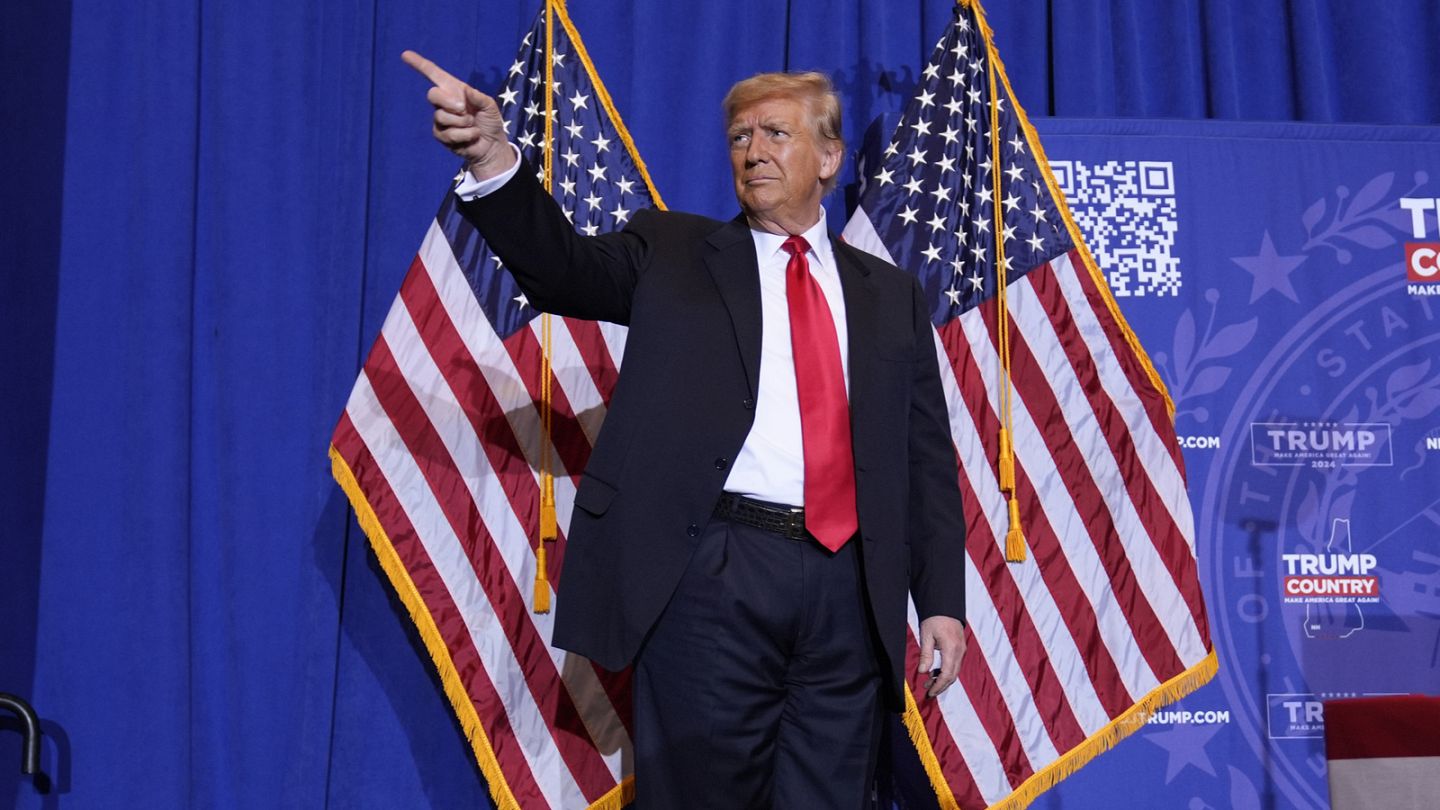Is Europe the Biggest Loser from Donald Trump’s Return to the White House?

“Trump’s isolationism still worries Europe deeply.”
European leaders, like many others, did not wait for Republican presidential candidate Donald Trump to get enough votes to congratulate him on his victory.
Although couched in diplomatic language, European congratulations to Trump were not without hints of deep concern about his second term.
Over the past period, Europeans have become accustomed to Washington being at the forefront of supporting Kiev financially, militarily and politically, but Trump’s return may introduce the Ukrainian-Russian war into a new equation.
According to European sources, the biggest fear is that Trump will turn his country’s policy upside down, stop supporting Ukraine and pressure it to accept a quick solution and give up its occupied territories.
During his previous term, Trump publicly criticized European NATO allies for not meeting the alliance's defense spending target of 2% of GDP.
In contrast, some European leaders were actually happy about Trump's victory in the US elections, especially those who lead far-right parties and agree with Trump on issues related to migration and refugees, including Hungarian Prime Minister Viktor Orban and Italian Prime Minister Giorgia Meloni.
Major Crisis
Perhaps the most prominent revelation of European concern about Donald Trump's return to the White House was the phone call that took place between French President Emmanuel Macron and German Chancellor Olaf Scholz shortly after the Republican candidate announced his victory in the presidential race.
French President Emmanuel Macron and German Chancellor Olaf Scholz congratulated Trump on his election victory, but were also quick to stress the challenges posed by his America First protectionist trade policy and isolationist rhetoric.
“The European Union must stand close together and act in a united manner,” Scholz said.
Macron wrote on X that “Berlin and Paris would work for a united, stronger Europe within the new context.”
In turn, British Prime Minister Keir Starmer congratulated Donald Trump on his historic election victory.
“As the closest of allies, the UK and US stand shoulder to shoulder in defense of our shared values of freedom, democracy and enterprise,” he said.
It is noteworthy that Trump's first term (2016-2020) witnessed significant tensions between the United States and Europe.
Trump had accused European countries of reducing defense spending and relying on American military power, targeting Germany in particular, which he described as lagging behind in this sector.
EU Commission President Ursula Von der Leyen said on X: “I congratulate Trump. The EU and the U.S. are more than just allies. We are bound by a true partnership between our people, uniting 800 million citizens.”
The statements of European leaders, NATO leaders and the EU, conceal more concerns, which Swedish Prime Minister Ulf Kristersson revealed explicitly.
After congratulating Trump on his victory, and wishing for the continuation of excellent relations between Sweden and the United States, he warned that a second Trump term would pose risks to a range of issues.
He stressed that the trade war between the United States and China would have dire consequences for European trade.
Kristersson also indicated that Europe and Sweden need to strengthen their support for Ukraine in order to convince the United States to maintain its aid levels.
Spain's Pedro Sanchez promised Trump and Spain would work on a strong transatlantic partnership.
Austria's Karl Nehammer congratulated the Republican candidate and former president before adding that Washington was an important partner for Europe's alpine nation.
Greek Prime Minister Kyriakos Mitsotakis and his Portuguese counterpart also wished Trump congratulations on his projected victory.
In Ukraine, there is a sense of disappointment over the loss of Democratic candidate Kamala Harris, especially after the strong support that Democrats gave to Kyiv during the war with Russia.
However, Ukrainian President Volodymyr Zelensky was quick to congratulate Trump, tweeting: “I look forward to personally congratulating President Trump and discussing ways to strengthen the strategic partnership between Ukraine and the United States.”
It is noteworthy that Trump's promises during his election campaign to end the Russian-Ukrainian war continue to raise fears in Kyiv and the Europeans that this will be done by handing over the reins to Russia and forcing NATO to retreat from the Russian border.

European Divisions
There is also European fear that Trump will play on European divisions in order to marginalize the union.
It is worth noting that the president-elect has allies among European leaders, including Hungary’s Viktor Orban, Slovakia’s Robert Fico, Serbia’s Aleksandar Vucic, and Dutch far-right leader Geert Wilders.
In addition, Italian Prime Minister Giorgia Meloni and far-right Sweden Democrats leader Jimmie Akesson, are also among Trump’s admirers.
In general, the European far right (in France, Germany, Austria, Spain, etc.) is a supporter of Trump, who is able to rely on this current to sow division in the European ranks.
Meloni called her country and the U.S. sister nations and wished Trump the most sincere congratulations.
A European source in Paris did not rule out that European leaders would rush to Washington to submit to Trump and emphasize the special relationship between their countries and the American partner in order to receive special treatment.
Some major European newspapers believe that Europe's big problem is that it is not fully prepared for Trump, as there is no European leader at the present time who has the ability to take the initiative in the European bloc, especially since France and Germany are going through political crises described as dangerous.
In this regard, the Neue Zürcher Zeitung newspaper in Switzerland believes that Europe must quickly fulfill its duty in terms of leading the West, before someone like Viktor Orban or Vladimir Putin himself takes over.
If the above does not happen, Der Spiegel believes that huge changes are expected in American foreign and security policy, which are likely to have negative repercussions, especially for the Europeans.
In turn, German Christian Democratic Union Chairman Friedrich Merz called Europe to show strength and take a firm and unified stance during Trump's second term.

European Fears
During his previous term, Trump did not hesitate to threaten the Europeans with withdrawing the American umbrella if they did not quickly pay their financial contributions to NATO.
He has repeatedly said that he would encourage Russia to do whatever the hell they want with Nato allies that did not pay enough in defence spending.
To ward off such a threat, NATO Secretary General Mark Rutte was quick to confirm recently that about two-thirds of the 32 NATO allies will meet the organization’s main defense spending target this year (2% of GDP).
France and other European countries see the Trump presidency and its risks as convincing the hesitant, especially Germany, to increase defense spending for a more united, stronger and sovereign Europe.
However, Eastern European countries, which feel the Russian threat more than others, see no alternative to the United States and NATO.
It is worth noting that the European continent has depended on the American military presence since the end of World War II.
With no end in sight to the Russian-Ukrainian war, Europe will have to fill any gap that the United States may leave.
But government debt in Europe is already approaching 90% of GDP, so finances are strained and governments will struggle to stimulate an economy suffering from trade barriers while financing military spending at the same time.

Some believe that the EU fears that Trump will later make decisions that he sees as in the interests of his country without regard to the interests of his European partners.
European Commission chief Ursula von der Leyen said avoiding trade wars would be in the U.S. interest as well as Europe's.
Investors are bracing for further economic pain in Europe that could deepen euro losses and hurt its stocks, as a second Donald Trump presidency raises the prospects of hefty tariffs.
Trump has vowed a 10% tariff on imports from all countries, a big blow for the European Union which has the second-largest trade deficit with the United States globally and is the largest exporter to the US, according to JPMorgan.
The EU faces more pain through its close ties with China, on whose imports Trump has pledged 60% tariffs, and may need to boost defence spending if Trump pulls U.S. support for Ukraine.
Trump said last month the EU would have to pay a big price for not buying enough American exports if he won the election.
In turn, political analyst Ibrahim Khatib said in a statement to Al-Estiklal that “Europeans stand to suffer strategically, economically and politically from Trump's America first policies, as well as from his unpredictability and transactional approach to global affairs.”
“Europe is also deeply concerned over the possible impact of a second Trump term on global efforts to combat climate change. There are fears Trump will once again quit the Paris Agreement on climate change,” he said.
Mr. Khatib noted that “Trump’s victory would jolt Europeans into doing more collectively for their defence, and building a stronger European pillar of NATO.”
Sources
- European leaders congratulate Trump on projected victory in US presidential race
- Why Donald Trump’s return is a disaster for Europe
- Kristersson on Trump's victory: We see the risks [Swedish]
- France, Germany urge Europe to unite in face of Trump election win
- For Europe's markets, Trump's return spells euro pain but bond gains












